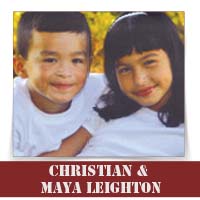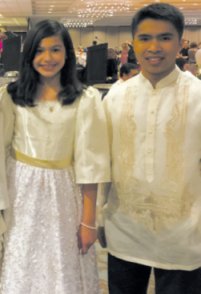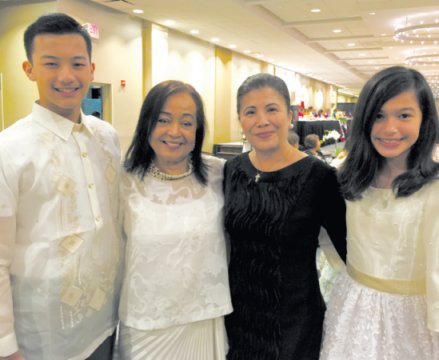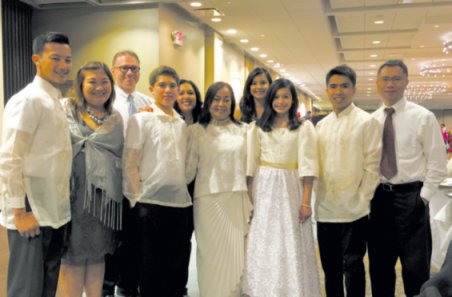By: Christian & Maya Leighton
Here’s from Maya…I am very happy to report that I participated in the Essay Writing Contest sponsored by the the Philippine Independence Week Committee (PIWC) 2015 held last May 16th at WilburWright College, and, amazingly, I won the 4th prize award. What a thrill! Happy to say that I am the only girl among the male winners. Thank you, PIWC, and thank you, Ms. Josefina WeeSit, for chairing this noteworthy project for the young Filipino American youth every year.
Here are the five winners of the essay contest who were honored and received their cash prizes during the last gala celebration of the Philippine Independence Week Committee (headed by Mrs. Ellen Tan) last June 13th at the Crowne Plaza Hotel.
Thank you, too, to Remo and Myrna Cordero for sponsoring the winners’ dinner tickets.
Christian Luciano —- 1st prize , $250
Benjamin Lortie ——— 2nd prize , $200
Reijay Vargas ———– 3rd prize , $150
Maya Leighton ———- 4th prize , $100
David Rivas ————- 5th prize , $ 50
I am honored to present the winning pieces of the five winners in this issue…
First Prize- PIWC Essay Writing Contest
Christian Luciano
Grade 11 at Northside College Prep
Parents: Alex and Terry Luciano
Filipinos: More Than a Typical Minority
“Are you a Filipino?” This is a question heard a multitude of times in a Filipino’s life, yet it has created a deeper question in itself. The answer to this question indicates that Filipinos must have some sort of defining characteristics that stand out in the different cultures that are scattered across America and around the world. What have shaped Filipinos throughout the years? Through traditions that Filipinos undertake yearly, monthly, and even daily, Filipinos have created a strong impression that makes them unique in the world. Characteristics that are both good and bad, strong and weak make Filipinos look charismatic yet annoying at the same time.
Filipinos gather in a holiday-heavy country such as America where a celebration takes place every few months. Thanksgiving, Christmas, Easter are all times when Filipino families visit each other. However, these are not regular celebrations. Filipinos bring everything to the table when the guests arrive. Literally, they eat plenty of home-cooked meals with pancit, lumpia, lechon, and other Filipino delicacies while catching up on jobs, children, and different travels. A party that lasts for hours finally culminates in intense, competitive karaoke singing at the end of the night. This reveals several different traits that people admire in Filipinos- and it’s not just that they like to sing. Gathering in one’s home to celebrate encourages family bonding and camaraderie. Sometimes in American homes, the bond is not so strong. Yet, Filipinos “stick together like rice.” Filipino celebrations also show hospitality in the greatest form. No matter how large the house, Filipinos pack as many people as they can into each room with twice as much food as they can eat. The house is full of laughter and chatter which radiate happiness that can only be seen in Filipinos.
However, sometimes traditions show an unpleasant side of Filipinos. For example, Pacquiao fights have certainly made their way in the traditions of Filipinos. What attribute can we see in these traditions? Filipinos would claim Manny would win as if it were already written in the history books. They would brag and boast that Manny is the best. While Filipinos see this as confidence, others see it as arrogance. Sometimes Filipinos fail to face the facts and remain a proud people. They don’t want to change themselves since they believe they are always right. They resist the urge to develop even further as a culture.
Other cultures continue to progress, which should be an example for the Filipino people. As a “model minority,” Filipinos are obligated to be a culture that everyone looks up to. Hospitality and a sense of family are important traits that should be inculcated inside and outside of the Filipino community. The best way to do this would be to lead by example. Filipinos must continue to be friendly and radiate the same warmth when they meet new people, invite guests over, and nurture old relationships. In terms of their arrogance, Filipinos are already becoming more open-minded. With an openness to other ideas, Filipinos can develop on an individual level. How great can Filipinos be? The world will know soon enough.
Second Prize- PIWC Essay Writing Contest
May 16, 2015-WiburWright College
by Benjamin R. Lortie
Grade 8 at St. Anne School-Barrington, IL
Parents: Jeff and Margaret Lortie
The Phillippines and Its Traditions
The Philippines is a truly great place with a lot of fascinating traditions and cultures. While I have never been to the actual islands or ever seen any of these celebrations the people do, I have a grandmother who was a Filipino immigrant and she tells me sometimes about these. I have heard about how people dance and sing during celebrations. I have also heard that a lot of people in the Philippines are very religious. Honestly, while some people might make fun of and put down what the Filipinos do, I find it actually quite interesting.
The Philippines has a lot of great traditions, and in my opinion, the traditions which some people say are weird or bad are normal in their culture and have a lot of history behind them. The Philippines has a lot of great traditions. I know that while they are probably not the most orthodox traditions, my family and I like to do a lot of things relating to our culture and heritage. For example, any time I go to my grandmother’s condo in Michigan, at least once or twice we eat Filipino food such as egg rolls, noodles, etc. Also, since she was born and raised in the Philippines, she makes the food in an authentic way. Whether she comes to visit at my house or I go to her house, she always tells me about the cultures in the Philippines. The people there like to dance and sing a lot. While I have never visited the country, I always feel like I am close to the Philippines when my grandmother visits. I always feel like I am in the Philippines because I see a lot of pictures from there, I eat a lot of their food, and I have a lot of relatives and family friends from the Philippines.
However, I have heard many negative things about the Philippines. Since I go to a school where not everybody is Filipino, it can be hard to hear bad things people say. Some people might think it is weird to sing and dance during celebrations, but I think it is unique. Once I saw some pictures of people reenacting Jesus’ crucifixion and people would literally nail someone on a cross. While some people might call that foolish and a waste of time, I think it shows their full dedication to their religion. While these traditions are not normal, they show that they are different from those of other countries which make them unique.
The Philippines has a lot of great traditions and while some people may put them down, I do not think they should because they have a lot of great qualities in them. I do not think that the people of the Philippines should change the way they celebrate because their celebrations show diversity and independence. I am very proud to be from the Philippines and I think that anyone who puts us down should not because we have centuries of history that are revealed in our culture through food, masses, parties, etc. While it does not have anything relating to tradition, we have a lot of famous people from the Philippines like Manny Pacquiao, Tiger Woods and Rob Schneider. For these reasons, I am proud to be from the Philippines. Since I am going into high school, I hope that I can learn more about where I come from. While I have not yet been there, I really want to visit some day because from what I have heard, it is really a fascinating experience to see the different traditions the Filipinos have.
Third Prize- PIWC Essay Writing
Contest May 16, 2015-Wibur
Wright College
Grade 7 at Lincoln Jr. High School
Parents: Anthony and Jocelyn Vargas
Positive and Negative Attributes Associated with Filipinos
As a minority group in the United States, Filipinos are a small class in the population, making up about 1.5% of the U.S. society. Although a small group, Filipinos are considered to possess both positive and negative traits associated with their nature and lifestyle. An example of a positive tradition associated with Filipinos is their respect for their elders.
Many link Filipinos with respect for others, most notably their seniors. As set by their culture, young Filipinos usually greet their seniors with a tradition called “Mano,” or “Pagmamano.” This gesture is performed by bowing and pressing his or her forehead to said relative’s hand. This act is done as a sign of respect, and it is initiated with the phrase “mano po,” which is derived from the Spanish word for hand, “mano” and the word “po” which is an address used for elders.
Another trait that is considered positive, and which makes up a big part of the Filipino lifestyle is religion. Filipinos tend to be religious. This is represented by the phrase “Bahala na” in Tagalog, which means “Leave it up to God.” Although there are significant positives, there are also negatives attributed with Filipinos. One negative aspect is the phrase “Ningas Kugon.” This phrase is a common Filipino idiom, which means “not permanent or not made to last.” This trait is represented by the excitement in the beginning of a project, and the inability to finish what was started. Another phrase related to this is “manana habit” which translates into “tomorrow” in English. This phrase stands for the procrastination of Filipinos.
Another phrase attributed to Filipinos is the phrase “Filipino time.” Filipino time is about the inattention to time that some Filipinos have. They seem to be minutes or hours behind. Another negative attribute is the Colonial Mentality. This means that they seem to have a preference for things that are foreign.
This mentality is shown in the U.S. and in the Philippines, where anything American is desired. There are many ways that Filipinos can publicize our good traits, and fix or improve the bad ones.
One way to broadcast our great respect for elders and our devotion to religion is by spreading our goodwill to others. Although Filipinos may not practice the exact traditions, they may hold seniors to a higher respect, and have more faith than they previously had or didn’t have. The more we demonstrate our respect and faith, the more it will become recognized.
On the negatives, some specific ways we can perfect our somewhat negative mentality is by staying positive throughout our life. We can also try to be more aware of time and create schedules for ourselves so we do not lose track of time and continue to be associated with the phrase “Filipino Time.”
Another way we can improve our lifestyles is by holding our own beliefs and traditions above others, so others will recognize our good traits.
By following our own traditions and improving our lifestyle, we can truly become a “role model” among minority groups in this county.
Fourth Prize- PIWC Essay Writing Contest
May 16, 2015-WiburWright College
by Maya Leighton
Grade 7 at Oscar Mayer Magnet School
Parents: Bobby and Christy Leighton
My Filipino Heritage
There are tradeoffs in living in the Philippines. There are positive and negative things in the Philippines. For the positive, there are lots of cooking in this country. Another thing is that there are lots of nature and beauty. For the negatives, there are lots of tsunamis and earthquakes happening there. Another negative is that there are children that live on the streets.
There are positives in the Philippines. Filipinos like to cook with coconut oil to make food taste and smell good. That’s a unique culture. They tend to look at the person eating their food. They do that because they want to see if it tastes good and if the person likes the food. They also make unique food that are not seen in other countries. For example, Filipino people make rice, fresh roasted pig, and even eggrolls. They are very tasty.
Another positive effect of living in the Philippines is there are lots of beautiful nature. From forests to beaches to waterfalls, whether for adventure of sightseeing, the Philippines is the place to be. There are many attractions, so the Philippines is really a place to visit.
However, there are negatives in the Philippines. In the Philippines, there are terrible events that happen. For instance, there are tsunamis and earthquakes. People lose their lives or get injured during or after these horrible events. Another negative aspect is there are children living on the streets. There are two types of street children. There are children who work on the streets to get money for their family because their parents don’t have jobs. Then they go back to their houses where their families are. On the other hand, there are children who live on the streets all the time. They are on their own because they have no families to love or support them. Some children work together on the streets and make families with their own. We can develop these positive traditions by giving each other hope and courage in the Philippines.
Filipino people are polite and hospitable to others. They do that a lot but we can do it even more to others who are feeling frustrated, glum or stressed. We can improve negative aspects by helping out the community. For example, if there is a disaster, we can help clean up and help out each other. Also, we can help the homeless. We can give some adults and children money because they are poor and not as fortunate as we are.
Fifth Prize- PIWC Essay Writing Contest
May 16, 2015-WiburWright College
by David Rivas
Grade 9 at Chicago Art High School
Parents: Jaime and Maria Lucy Rivas
Aspects of the Filipino Culture
Coming from a Filipino family, I have found that the Filipino culture is one of the most important aspects in our home. Traditions such as the “Mano Po” “Kiss of the hand and also the word “po” when talking to elders is an important and unique tradition of the Filipinos. Those small traditions make the Filipino culture valuable.
In contrast to the positive traditions, the Filipino culture has negative aspects as well. The tradition of eating using the hands and not utensils is something negative. First of all, the Filipino people are very respectful to their elders. The tradition of the “Mano po” which means “the kiss of the hand” as well as the word “po” is something very unique and admirable about the Filipino culture.
“Mano po” shows respect to the Filipino elders. It shows the respect and the admiration towards the elder they are greeting or speaking to. It shows great personality and kindness of a person by using the “Mano po” to greet an elder and using the word “po” when speaking. Besides showing kindness and respect, it also shows that the Filipino people admire their elders.
To add on, the Filipinos have great aspects in their culture. But while there are positives, there are also negatives. One tradition considered negative in our culture is eating with bare hands. It may seem very unique but it is a tradition that is found not only in Filipino culture but also in other cultures. For people who witness this, they may say it is dirty or unsanitary which reflects back to our culture as something negative.
The majority of the aspects of Filipino practices is based on their family background. Eating with bare hands is something that is in our culture and our mind set but it can be unsanitary. In short, the Filipino tradition is something very unique and makes up the Filipino culture.
Positive aspects such as the “Mano po” and the word “Po” are something extremely significant. They show great respect and kindness to the elders. The “Mano po” and the word “po” have been part of the Filipino traditions for may years. That specific tradition should not be changed to show more respect or kindness to a person. Then, the tradition of eating with our bare hands, can be improved. A way we can modify or improve that cultural tradition is by showing that it is unsanitary. Use of proper utensils in eating should be shown to children at an early age.
The Filipino traditions and aspects have their positives and negatives. Out little traditions make up what it called our culture. Our tradition of the “Mano Po” and use of the word “po” is something that is considered positive and the tradition of eating with just our hands is something negative.
Those positives and negatives make up the Filipino culture and the nation. These traditions will be carried on from generation to generation and they will eventually be modified as the generations pass by
(1) PIWC essay writing contest winners, all wearing Philippine attire at the PIWC gala night, from left, David Rivas (5th prize), Benjamin Lortie (2nd prize), Maya Leighton (4th prize) & Christian Luciano (1st prize), not in picture is Reijay Vargas (3rd prize).; (2) From left: David Rivas, Veronica, Nelsie Guevarra (Chicago visitor, owner of Girl Shoppe in Makati, Philippines & David’s aunt) and Maya Leighton.
The PIWC Essay Writing Contest winners with their respective parents pose for a memorable picture at the PIWC Gala Night. Not in picture is Reijay Vargas, 3rd prize winner. (Photo by Chie Rivas)
 VIA Times – June 2015 Issue Vital News, Vibrant Views for Asian Americans in Chicago & Midwest
VIA Times – June 2015 Issue Vital News, Vibrant Views for Asian Americans in Chicago & Midwest













